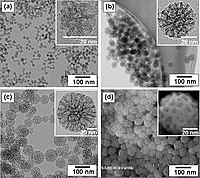
Photo from wikipedia
Janus cylinders are one-dimensional colloids that have two faces with different compositions and functionalities, and are useful as building blocks for advanced functional materials. Such anisotropic objects are difficult to… Click to show full abstract
Janus cylinders are one-dimensional colloids that have two faces with different compositions and functionalities, and are useful as building blocks for advanced functional materials. Such anisotropic objects are difficult to prepare with nanometric dimensions. Here we describe a robust and versatile strategy to form micrometer long Janus nanorods with diameters in the 10-nanometer range, by self-assembly in water of end-functionalized polymers. The Janus topology is not a result of the phase segregation of incompatible polymer arms, but is driven by the interactions between unsymmetrical and complementary hydrogen bonded stickers. Therefore, even compatible polymers can be used to form these Janus objects. In fact, any polymers should qualify, as long as they do not prevent co-assembly of the stickers. To illustrate their applicative potential, we show that these Janus nanorods can efficiently stabilize oil-in-water emulsions.
Journal Title: Nature Communications
Year Published: 2020
Link to full text (if available)
Share on Social Media: Sign Up to like & get
recommendations!